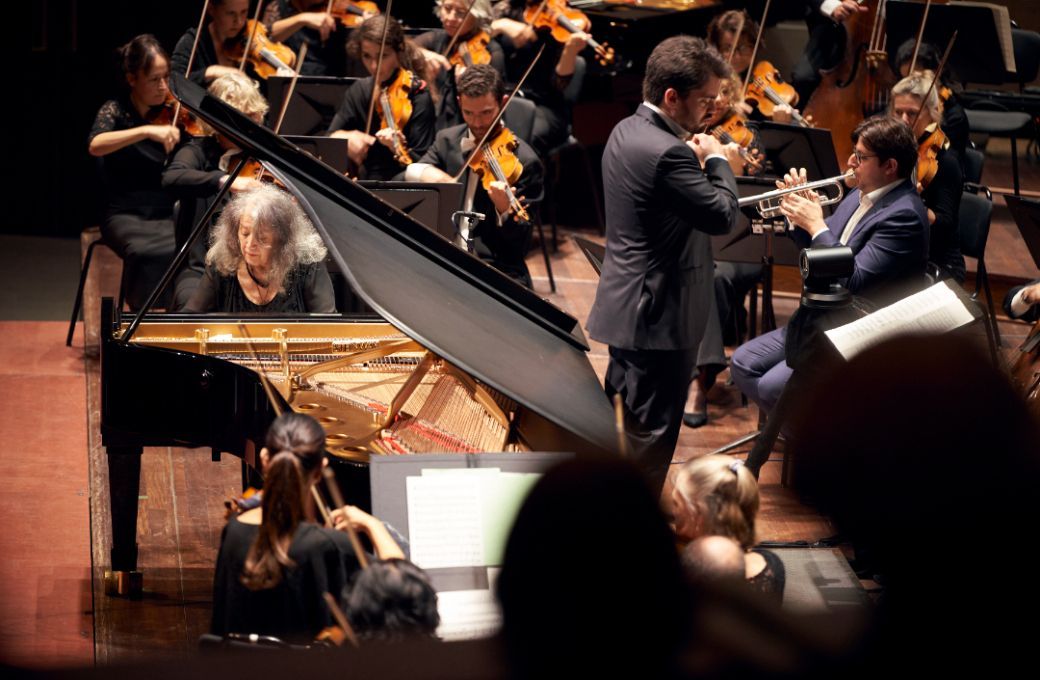Gardiner’s Evening Hymn has opened many concerts in its time but never quite like this. After what proved a very sad and difficult day in Rotterdam, principal conductor Lahav Shani’s breathtakingly beautiful orchestration the English choral favourite proved as soothing as it was uplifting. Scored as a companion piece to the Stravinsky on the programme, Shani’s arrangement dispenses with the higher strings so that the earthy textures in the bass are the supporting bedrock that let the vocal lines soar. The Laurens Symfonisch koor produced an absolutely unified sound of pinpoint accuracy, at once muscular and ethereal. I’ve never heard anything quite like it. If you were to hear angels, you’d want them to sound like this – that they’ll survive anything, that their offer of everlasting light is resolute and non-negotiable.
Stravinsky’s belief that music is better able than the building of a cathedral to praise the almighty was a guiding principal of his Symphony of Psalms, though he hadn’t had the pleasure of Rotterdam’s magnificent De Doelen, whose pin-drop acoustics are complemented by an exuberant and democratic vastness. In such a space, ensemble becomes all-important and despite the size of the Laurens Symfonisch, the alertness of communication between choir, Rotterdam Philharmonic and conductor gave the piece the intimacy of chamber music, making the fortissimo reached in Et immisit in os meum canticum all the more powerful and extraordinary. Then, after all the drama, the mystery of praise in the firmament in the final movement’s setting of Psalm 150 was a silken loop of infinity.
Once the firmament had been rearranged a little, it was time for its biggest star, Martha Argerich, to take her place there in her customary let’s-get-on-with-it fashion, along with the RPhO’s Principal Trumpet, Alex Elia. Although martinis on zipwires may not be recommended for the over-eighties, Argerich eagerly led the charge through Shostakovich’s daredevil musical bingo of a First Piano Concerto, both soloists playing fast and loose with quotations from Haydn, Beethoven, Rachmaninov, street song and jazz that flicks-pianist Shostakovich crammed in to this perennial crowd-pleaser.

The RPhO, supple as quicksilver, kept pace with what, by the fourth movement, felt like an increasingly anarchic game. Elia danced in his seat, just about waiting his turn, and once he'd settled in to his swaggering tune, with a delicious clarity of tone, Argerich threatened to stop the show with that famous attention-seeking chord. Shani turned from the podium with a what-do-you-think-you’re-playing-at? gesture to the world’s most celebrated pianist and just like that we’ve come through the screen where an elderly woman still at the peak of her powers is playing mic-drop in public with two young men who are just coming into their own.
With no score to get between him and whatever might happen next, Shani mastered the misrule, only relinquishing control in order to let Argerich rip through the cadenza, with Elia arriving just in time to provide Shostakovich’s slapstick curtain down-up-down ending, the whole purpose of which is to have the audience on their feet. It worked. De Doelen went wild and nobody was allowed to leave the stage until they’d done the whole last movement all over again, everyone had gone wild again and Argerich had firmly closed the lid over the smoking keys.
With eight double basses along the back of the stage and the two violin sections on opposing sides, the symmetrically arranged RPhO, bows flashing through the March of the Knights, physically dramatised the warring houses of Prokoviev’s Romeo and Juliet every bit as much as they played it. All the awkwardness and vulnerability of teenage love was there against the massed forces of fate, all with a vivid sense that anything might happen. Shani’s orchestra is a living thing, their interpretation organic and virtuosic. The rigorous discipline of ensemble means they can take risks so that even pieces like this one, that you’ve heard a hundred times, become something new, something thrillingly and hair-raisingly alive.


